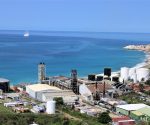Mar, bribe and destroy
![]()
By Hilbert Haar
It is not a good week for the United St. Maarten party (USp), its faction leader Claudius Buncamper and its founder Frans Richardson.
Like attracts like, or as the Dutch like to say: soort zoekt soort. This seems to apply to the kind of people the USp attracts: characters with a tendency to bend rules and regulations beyond breaking point to get what they want.
Buncamper is facing a 3-year prison sentence and Richardson received a 12-month sentence, on top of an earlier conviction to 36 months. To be clear: the 3 years of imprisonment against Buncamper is the demand by the public prosecutor. Sentencing follows in December or in early January. Whatever the result will be: the next step is an appeal and when that does not work there is always the Supreme Court.
All that time the defendants will claim that they are innocent until proven guilty. This enables Buncamper to stick for quite some time to his seat in parliament and its accompanying bloated financial compensation. It will take the court around four months before it hears his case on appeal; then it will take three weeks to write its verdict. If the case then goes for cassation to the Supreme Court, it could take another two years – and sometimes more – before a verdict is final, unless the highest court sends the case back to the Common Court of Justice. By that time, everybody and his uncle has forgotten what the case was all about.
It is a cumbersome process but it befits the administration of justice in a constitutional state. Defendants are entitled to use every option the law has to offer to defend themselves. I have no problem with that concept at all.
What does bother me is the rather predictable reaction from Buncamper and from quite some others before him. He has argued that the trial against him is politically motivated.
If you look at the laws that are in place to protect politicians against political prosecution, it becomes clear that this argument does not make sense at all. Prosecutors cannot just decide to go after a politician because of perceived dislikes. They need to present a convincing case to the Common Court of Justice and to obtain permission from the attorney-general to prosecute. There is definitely a difference between political prosecution and prosecuting a politician.
Politicians who stay away from nefarious activities like bribery have nothing to fear from the public prosecutor. Sadly, over the past decades we have witnessed how one politician after the other found himself at the center of criminal prosecution.
So when a politician says, as some have done, that the prosecutor’s office is targeting all politicians, they are blowing a lot of smoke. Only politicians who broke the law, and those against whom there were serious suspicions that they had done so, have attracted the attention of the prosecutor’s office.
One cannot say with a straight face that all politicians are corrupt. But in St. Maarten’s case, it is undeniably true that a lot of politicians have crossed the line to the detriment of the people they were supposed to represent: Louie Laveist, Patrick Illidge, Silvio Matser, Frans Richardson, Theo Heyliger, Chanel Brownbill. Please forgive me if I left anyone out.
The seriousness of the allegations against a these politicians goes way deeper than their personal misfortune (of being caught, locked up, dragged into court and sentenced). Sure, I understand that at least some of these people have families, but they could have thought about that before they broke the law. Fact is, they didn’t. They simply got what they deserved.
But who is paying the price for all this? Ironically, these are the good citizens who actually voted some of these politicians into office. Yeah, how stupid can you be?
Because there is no doubt that bribery and corruption are driving prices up and erode the quality of government services – the way a kilo of cocaine becomes more expensive for each customs officers that has to be paid off.
Are we then so attached to our way of doing things that we are prepared to accept corruption as a way of life? Based on results I have to conclude that this is indeed the attitude that appeals to too many people on our island.
Theconveration.com reports that corruption stems from the Latin term corruptus, the past particle of corrumpere; it means: mar, bribe, destroy.
Corruption seems to be part of the human DNA. It occurred already in the ancient civilizations of Egypt, China and Greece. The World Bank estimates that these days international bribery is worth more than $1.5 trillion annually. Against that background, corruption in St. Maarten is small beer. But because of the size of our community, its effects can be devastating.
One could argue that “everybody does it” but that does not make corrupt undertakings right. It would also be naïve to think that corruption can be eradicated.
The question is however when our local body politics will stand up against corruption. That is not happening right now: once one of our politicians gets arrested, other politicians express their support.
My conclusion: if you are looking for a promising career, choose law enforcement. As long as there is corruption, your job will be guaranteed.

























